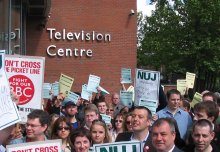Shock at BBC bosses' bonuses

Placards waved by angry BBC staff during a strike on May 23 this year.
BECTU has condemned fat-cat bonuses to top executives revealed in the BBC's Annual Report, published today July 12.
The union has called on members of the BBC's Executive Board to follow the example of Director-General Mark Thompson and hand back the bonuses they have received on top of their six-figure salary packages.
Thompson told BBC staff via e-mail that he had decided to waive his bonus as a "personal decision". He also said that he has recommended to the Corporation's Governors, in charge of remuneration, that future executive bonuses should be limited to 10% of salary.
For this year though, 16 of his fellow Executive Board members have shared £718,000 in bonuses and taxable benefits in addition to their salaries, representing an average bonus of 24%.
BECTU's Gerry Morrissey accused the BBC's top management of "feathering their own nests", and predicted that the current discussions on a potential 4,000 job cuts across the Corporation would now be much more difficult than expected.
"Staff are not going to accept job cuts, especially compulsory redundancies, easily while the bosses who planned them in the first place are giving themselves fat-cat bonuses", said Morrissey.
"In the last year the top management have continued to sell the BBC's family silver by pressing on with privatisation plans, and have had to admit that some of their earlier money-saving plans, like the property contract with Land Securities Trillium, weren't working out as planned", continued Morrissey.
Detailed figures in the BBC's Annual Report reveal that in addition to generous bonuses, several top executives enjoyed increases in basic pay that far outstripped the rise of 2.9% given to staff last August.
Director of Television, Jana Bennett, received a rise of 8.5%, taking her salary to £255,000, while her radio counterpart Jenny Abramsky saw her basic salary rise by 6.8% to £233,000. A slightly smaller increase of 6.1% went to Director of Human Resources Stephen Dando.
No annual increase was recorded for DG Mark Thompson, who took up his position in June 2004, after the start of the financial year, however the salary he earned in 2004/05 indicates that he is on a basic rate of just over £500,000, significantly more than his predecessor Greg Dyke who was on £368,000 pa when he left abruptly in January 2004.
The revelation that top BBC executives have continued to enjoy high salaries and generous bonuses comes at an embarrassing time for the Corporation. Staff, whose salaries are often less than a tenth of those paid to top management, are currently voting on a 3.5% pay offer, after a year in which morale has slumped in the face of plans to cut jobs and privatise more BBC activities.
In May all three BBC unions called a one-day strike in protest at cuts and privatisation, and officials have warned that action could be resumed if a major round of negotiations on change which began last week has not produced results by Autumn.

Comments received
Besides their fat-cat salaries the BBC executives are pressing ahead with the plans of continual outsourcing. Future bonuses will meet little resistance as there will be less BBC staff to complain.
When will BECTU stop placing any faith in the 'special' relationship with the Labour party and start emphasising the need to fight any further privatisations. In fact we should go further and raise the prospect of re-incorporating those departments that have been sold off. It seems the more people the executive succeed in getting rid of the bigger their bonuses. Are BECTU going to accept fighting each attack seperately?
Tim, BBC staff, London UK 12 July 2005
I was under the impression that bonuses were rewarded for improvement etc in business? Where's the improvement? No morale, no staff, no support systems that really work. So can I have a 30% bonus (just for this year and then 10% next year onwards) instead of a 3.5% pay rise?
M, BBC staff, Bristol UK 12 July 2005
Comments are no longer being accepted for this item.